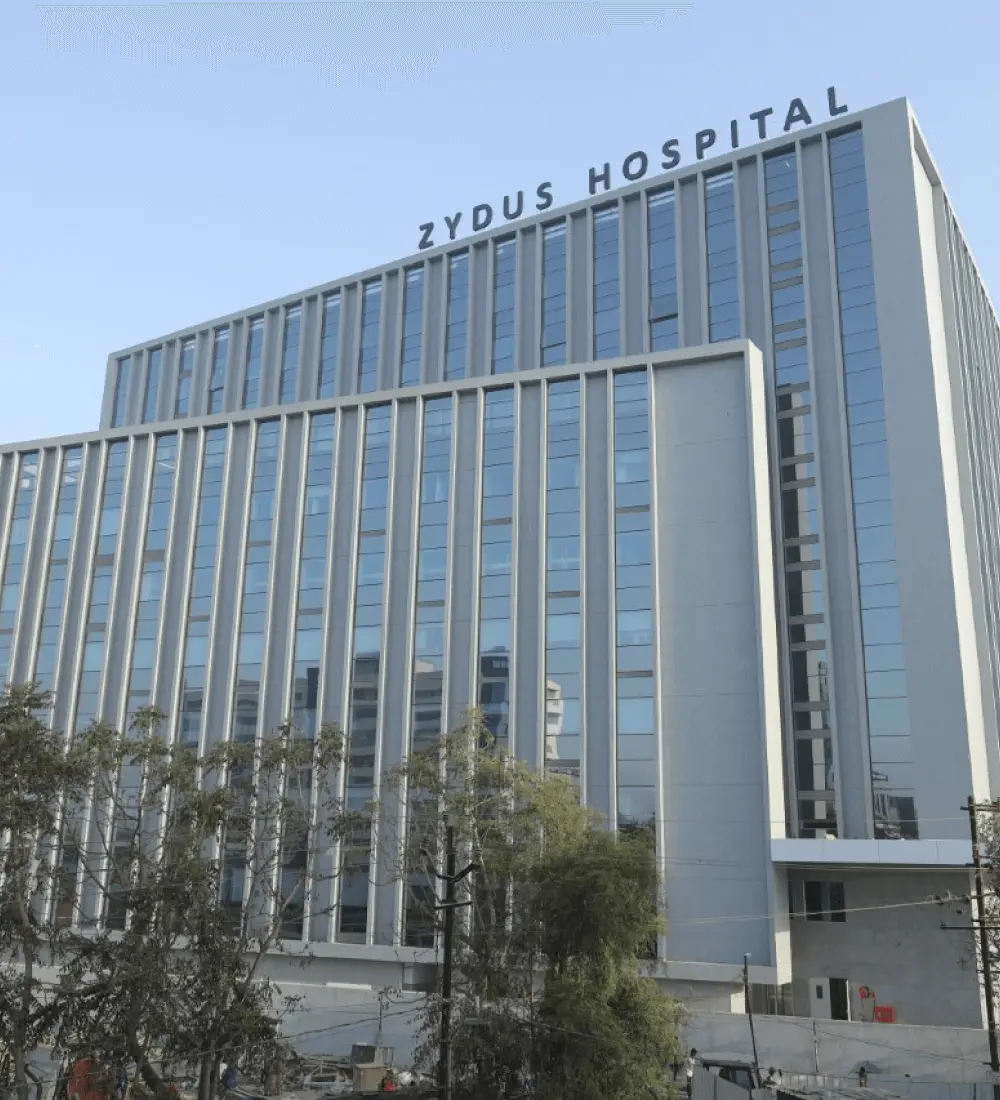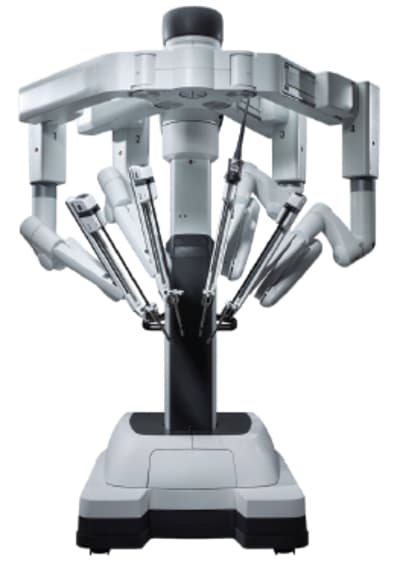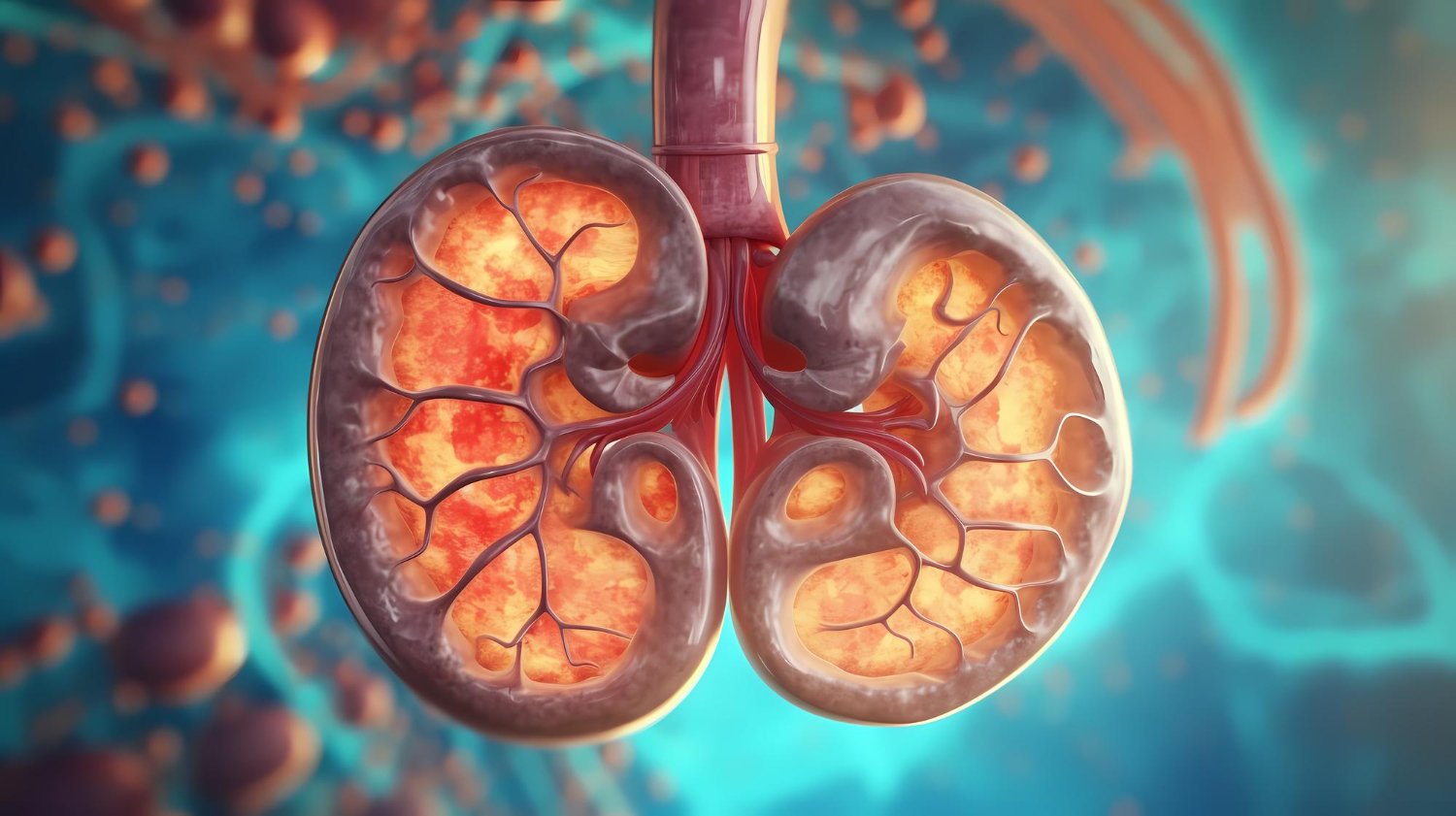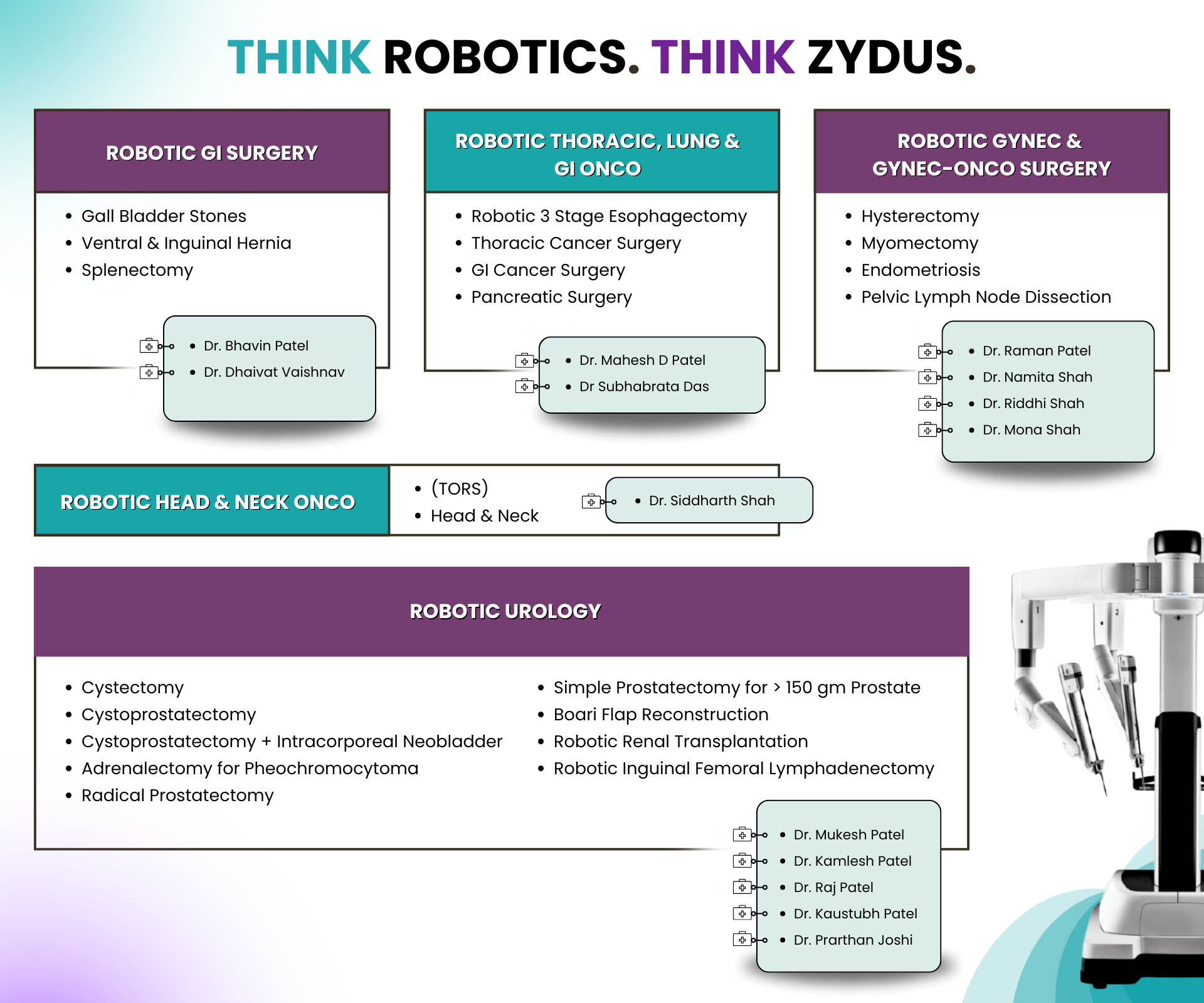
Best Multispeciality and Cancer Hospital in Vadodara
Book an Appointment
-
Zydus Hospital Vadodara is among the biggest hospitals in Gujarat, offering a 4-lakh sq. ft. campus backed by next-generation technology and internationally-acclaimed clinical protocols. With a 24/7 team of super-specialists, we operate as both a top multispeciality hospital and the best cancer hospital in Vadodara, delivering end-to-end care from diagnosis to recovery. Whether it's a cardiac emergency, a complex malignant tumour surgery, or a chronic condition, patients receive holistic care and comprehensive diagnosis from the best doctors in the state.
-
Recognised as the best cancer hospital in Vadodara, Zydus offers coordinated diagnosis to recovery pathways with a priority on medical precision, technological leadership, and human empathy. With a dedicated cancer unit and round-the-clock emergency response department, Zydus provides services across critical specialties, ensuring patients have access to advanced therapies swiftly.
-
Book an Appointment | Explore Our Specialties
-
Within our campus, the dedicated cancer hospital wing is a beacon of innovation and hope. Esteemed as the best cancer hospital in India, it is driven by a multidisciplinary team, Tumor Board, and other technical staff who guide patient-centric, evidence-based oncology care. Precision diagnostics and integrated support systems define our approach, addressing the most challenging cancer cases with advanced protocols.
-
About Purple Prime Club
Our goal at Purple Prime Club is to provide our Silver Generation with a lively and supportive community. We aim to improve senior citizens' quality of life by providing comprehensive support, deep connections, and chances for general well-being through our special membership card and carefully chosen programs.
View More
Zydus’ Best Cancer Treatment in Vadodara
-
Zydus Vadodara brings together leading specialists in cardiology, neurology, nephrology, gastroenterology, orthopaedics, pulmonology, and women's health. Supported by high-end diagnostics, our departments function with clinical synergy to address complex cases across all ages.
Advanced Multispeciality Treatments
Top Clinical Departments & Specialties:
- Cardiology: Angiography, Angioplasty, valve repair, pacemaker procedures, cardiac rehab
- Neurology & Neurosurgery: Stroke care, brain tumours, epilepsy, Alzheimer's, dementia, Parkinson's, vertigo, migraine, headaches
- Gastroenterology: Esophagus, small intestine & pancreas, colon, gall bladder, liver, rectum disorders, Hernia, ERCP, surgical gastroenterology, endoscopy, and more
- Nephrology & Urology: Kidney disorders, Dialysis, prostate cancer treatment in Vadodara, kidney stones, and more
- Orthopaedics: Joint replacements, arthroscopy, trauma management, osteoporosis
- Pulmonology: COPD, asthma, bronchoscopy, critical care support
- Internal Medicine & Diabetology: Chronic disease and metabolic disorder management
What Makes Us the Best Hospital in Vadodara:

Specialized Urology and Kidney Care with Robotic Surgery Advantages
-
Our nephrology and urology departments combine decades of clinical experience with modern medical infrastructure. As a urology specialist in Vadodara, we deliver advanced care in robotic kidney transplant surgery and complex urological reconstructions, ensuring patients receive treatment with both precision and compassion.
-
Zydus’ medical team works in a fully integrated setup where nephrologists, urologists, transplant surgeons, anesthetists, and rehabilitation experts collaborate. This model allows us to provide comprehensive evaluation, accurate diagnosis, and personalized treatment plans. As a urology multispeciality hospital Vadodara, we address both acute and chronic conditions with the latest surgical and non-surgical solutions.

Our Expertise in Kidney Care
- Kidney Transplant in Vadodara - Offering both conventional and robotic-assisted kidney transplant options for faster recovery, minimal scarring, and reduced post-operative complications.
- Kidney Cancer Surgery - Providing expertise in robotic kidney tumor removal while prioritizing organ preservation and long-term kidney function.
- Management of Chronic Kidney Disease (CKD) - Our Chronic Kidney Disease Treatment in Vadodara includes early detection programs, dialysis services, and lifestyle guidance to help slow disease progression and improve quality of life.
- Kidney Stone Treatment - Minimally invasive options such as laser lithotripsy and ureteroscopic stone removal shorten hospital stays, reduce pain, and promote faster recovery.
- Prostate & Bladder Surgery - Expert-led treatment for prostate enlargement, urinary incontinence, and bladder cancer, including prostate cancer Da Vinci robotic surgery. Our team of urology surgeons in Vadodara ensures optimal results in these delicate procedures.
- Pediatric Urology - Specialized care for congenital kidney and urinary tract disorders in children, backed by advanced nephrology treatment and pediatric surgical expertise.
Our Treatment Technology
- Robotic Surgery Platforms - Featuring the Da Vinci Xi Surgical System for unmatched precision in urological and transplant procedures.
- High-Definition 3D Imaging - Gives surgeons a magnified, true-to-life view of delicate anatomical structures, improving accuracy in every operation.
- Laser & Endoscopic Systems - Designed for scar-free kidney stone surgery and minimally invasive tumor removal.
- Advanced Dialysis Units - Engineered to enhance patient comfort while maintaining treatment efficiency for those requiring regular dialysis.
- Single-Port & Laparoscopic Surgery - Enables smaller incisions, faster recovery, and minimal surgical trauma, reinforcing our commitment to advanced kidney treatment in Vadodara.
By combining robotic surgery with world-class nephrology and urology treatment in Vadodara, Zydus Hospital delivers the benefits of shorter recovery times, minimal scarring, and improved clinical outcomes without compromising safety or clinical excellence..
Advanced kidney stone treatment in Vadodara
-
Zydus Hospitals Vadodara offers top-quality kidney stone treatment in a compassionate and personalized manner. As a trusted kidney hospital in Vadodara, we offer advanced technology and experienced urologists to provide effective and minimally invasive Kidney Stone Treatment in Vadodara.
-
Kidney stones can be painful and lead to difficulties if not treated on time. Our team performs comprehensive evaluations with modern diagnostic tools to understand the size, location and composition of the stone to create a focused treatment plan.
-
Our kidney stone treatment includes both non-invasive methods. These techniques are well evaluated and provide fast recovery, less pain compared to the traditional approach.
-
- Non-surgical therapies such as medication and lifestyle advice
- Laser lithotripsy for targeted stone removal
- Ureteroscopy for stones in the ureter
- Percutaneous nephrolithotomy (PCNL) for complicated cases
-
Choose Zydus as your kidney hospital in Vadodara to receive the best in quality care and trusted expertise for your kidney stone therapy.

Comprehensive Cancer Care in Vadodara
Zydus Cancer Treatment Centre in Vadodara offers protocol-based care for all major cancer types, with specialists trained in global best practices. Organ-specific teams ensure that every patient receives the right treatment for their unique diagnosis.
The Advanced Technology for Cancer Treatment, Available at Zydus, Vadodara:
FAQ
-
Zydus Cancer Hospital Vadodara is widely recognized as one of the best hospitals for cancer treatment in Gujarat. With a dedicated oncology wing, multidisciplinary internal tumor board, and advanced diagnostics like PET-CT, dual-energy CT, and Elekta Versa HD LINAC, patients receive precise and compassionate care under one roof.
-
Yes. Zydus Cancer Hospital offers Gujarat’s largest HEPA-filtered Bone Marrow Transplant (BMT) unit, providing both autologous and allogeneic transplants, including matched sibling and haploidentical procedures. The center is trusted for complex hematological cancers and rare blood disorders.
-
Yes. Zydus provides comprehensive cancer treatment for a wide range of cancers, including breast cancer, blood cancers such as lymphoma and Leukemia treatment in Vadodara, lung cancer, colon cancer, liver cancer, kidney cancer, and prostate cancer. Specialized teams for each cancer type ensure personalized treatment protocols based on tumor biology and staging.
-
Yes. Zydus offers several Solid breast cancer treatments, colon, gastrointestinal, genitourinary cancers, and solid tumors surgery in Vadodara.
-
We offer systemic chemotherapy treatment in Vadodara across all cancer types, from blood cancer treatment in Vadodara to Breast cancer treatment. You get all the cancer checkups and cure, with daycare infusion, and side effect management from the best oncologist in Vadodara.
-
Yes. Zydus Cancer Hospital is among the few centers offering formal palliative treatment in Vadodara. These include pain management, psychological support, home care planning, and nutritional counseling to improve quality of life during and after treatment.
-
Yes. Zydus Hospital works with multiple insurance providers and TPAs to ensure patients can access cancer care with reduced financial stress. Cashless and reimbursement options are available, subject to individual policy terms. You can get the detailed information from the insurance help desk as well.
Your Journey to Healing Starts Here
Facing a serious diagnosis can feel overwhelming, but you don’t have to do it alone. Zydus Hospital Vadodara offers compassionate experts, advanced treatments, and a care team that walks with you every step of the way. Whether it’s a second opinion, ongoing treatment, or a fresh start, you’re in safe hands.
Book Your Consultation
Explore Cancer Treatment Options in Vadodara










